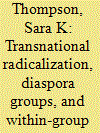| Srl | Item |
| 1 |
ID:
164670


|
|
|
|
|
| Summary/Abstract |
In this article we explore the role of the Somali diaspora in Norwegian foreign policy towards Somalia through an in-depth case study. This empirical study sheds new light on the foreign policy impact of ethnic lobby groups by demonstrating three important points: 1) diaspora organizational strength can only be understood fully by taking a transnational approach, 2) diaspora lobbying attempts depend on interaction between diaspora and decision makers, and 3) in order to understand the potential success of diaspora lobbying, internal fragmentation as well as potential points of agreement need to be recognized. In order to incorporate these points, we suggest a theoretical model that bridges literature on the foreign policy impact of ethnic lobby groups and work on the transnational political ties of migrants. Our model adds the transnational ties and resources of diaspora and feedback loops between states and diaspora into ethnic lobby literature models on conditions for successful lobbying. This model will benefit future studies on the role of other diaspora groups in foreign policy formation towards their country of origin.
|
|
|
|
|
|
|
|
|
|
|
|
|
|
|
|
| 2 |
ID:
166676


|
|
|
|
|
| Summary/Abstract |
In recent years, the Tamil and Somali diasporas have come under intense scrutiny by the media and national security agencies in Canada. This is due to concerns that members of both communities may hold political grievances associated with their respective homelands that could be acted upon by joining or supporting transnational terrorist groups. Drawing on 168 in-depth interviews with youth and young adults in Toronto’s Tamil and Somali diasporas, we provide a comparative analysis of the varying ways that existing sentiment pools can operate to mobilize broad-levels of support for, or vilification of, the framing strategies of the LTTE and al Shabaab, respectively. Our findings show that frames that portray the LTTE in a positive light resonate deeply with the young Tamil-Canadians we interviewed, characterizing a “narrative fidelity” between these frames and the existing sentiment pool. By contrast, there exists considerable disconnect between the framing strategies of al Shabaab, their supporters, and existing sentiment within the Somali diaspora – a divide that illustrates the notion of “framing failure”. We conclude with a discussion of the dynamic nature and inherent malleability of group-level sentiment pools, and highlight why this may be important from a national security standpoint.
|
|
|
|
|
|
|
|
|
|
|
|
|
|
|
|